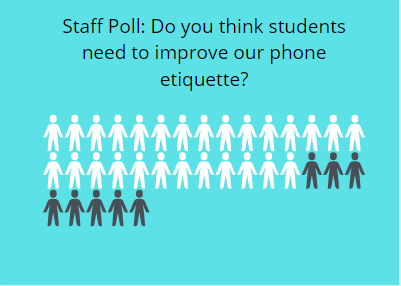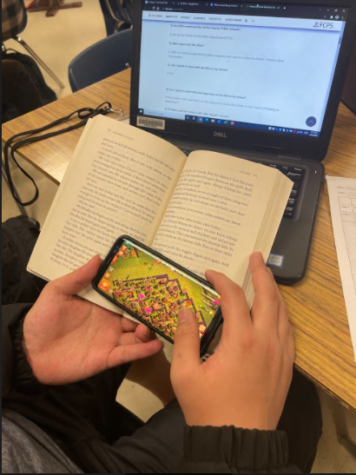Staff Editorial: Phone etiquette needs to be improved

Out of the 35 members polled, 27 agreed that students should improve etiquette, while eight disagreed with this.
January 2, 2022
From the front of the classroom, teachers are not always presented with a pleasing sight; across the room, students have heads laying down on their desks, and others are glued to their phone screen.
While the teacher is talking, students divert their attention to their phones instead, focused on messaging friends and family or playing games instead of doing their work. It is important to a student’s education that phones be put away during class because of the distraction they’ve become, especially in our generation.
Although phones can be used as an outlet to destress and relax from a stressful day at school, it can distract us from our priorities. According to MV Organizing, recent college studies show that 95% of students go on their phones during class and 92% use their phones just to simply text. Ten percent have also admitted to using their phones during an exam.
Many schools have a “no phone policy” that all students are required to follow. CHS is lenient and doesn’t have this policy, but some students take advantage of this. According to Net Nanny, some strict rules other schools have include only using the phone for safety reasons, phones must be stored away throughout the school day, and placing the phone in a locker for the first bell of the day to the last.
According to Very Well Family, phones can lower grades if used too much. Having proper phone etiquette can also benefit students. A study from the Journal of Educational Psychology showed that 118 upper-level students in college studied for the exams. Those who didn’t, or had their phones out for something other than educational purposes, scored half a letter grade lower on the exams.

(Katelyn Chu)
Losing the distraction of phones can help improve focus and concentration. To do this, students can shut off their phone before class begins and put it in a place out of their sight. Even simply turning off the ringer or asking the teacher before using it will help prevent students from instinctively reaching for their phones during instructional time.
Student addiction to electronics has worsened after distance learning. Since teachers could not stop students from using their phones during the virtual class, students were able to freely use their devices whenever they wanted to with no repercussions. Now that school is back in-person, it seems many students now have a hard time putting phones down while class is in session.
From the University of Arizona, studies have shown that phone addiction can cause depression or anxiety, if taken to an extreme level. Women, who have a higher probability of getting addicted, have a stronger chance of getting depression. Being on the phone too much can cause stress or unhappiness as well. Only if one goes online too often can these effects take place, but being self aware is a good step in the right direction.
To digitally detox, consider deleting unnecessary apps that take up lots of time and attention, such as games and social media. Most phones also have a screen time feature that can limit phone usage. Adjusting the settings to grayscale would also make it less appealing to use.
Teachers do all that they can to improve our education and watch us succeed, so they deserve attention from students, especially when they’re teaching a subject they love. It’s about respect and responsibility, and teachers can tell which students give it to them. Teachers set up lesson plans, power points and fun activities for students to do, so going on a phone during their teaching time is very disrespectful.



